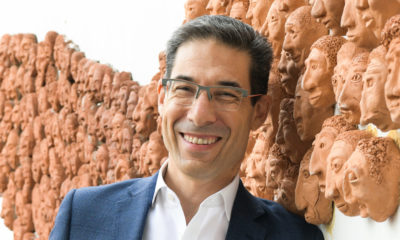
Featured Item

Cabaret isn’t your average school play
Jewish educator Joseph Gerassi directed Cabaret, on stage at Redhill School this week. It wasn’t by chance. He chose a play that tackles the issue of antisemitism in pre-World War II Germany. The SA Jewish Report asked him some questions.
What made you choose to do Cabaret as the school’s production this year?
Two reasons. First, when choosing a school musical, I always look at the talent amongst the students and then choose a play that will be able to show off this talent. I knew I had the right students to play the challenging roles in Cabaret, roles that would challenge them as well as allow them to shine. Second, it’s important not only to do fun musicals, but to choose musicals from time to time that have important messages for the audience and which challenge students’ thinking about the world around them. Cabaret certainly did both.
What significance does this play have for the world right now?
Although Cabaret was written in 1966 about 1930s Berlin, the issues presented in the musical are as pertinent today as they were then. Cabaret is a cautionary tale about being aware of what’s happening around you, which resonates with us today as much as it did in the 1930s. Given the rise of totalitarianism, racism, homophobia, gender-based violence, and an ever-increasing surge of antisemitism, we can all learn lessons from Cabaret.
One of the main themes of the play is antisemitism. How did you approach this with your students?
As with all the themes in the play – gender, racial profiling, inclusiveness, fear of the other etc, we spent many hours discussing the themes with the cast. It was important for them to understand the complicated and challenging issues within the musical to be able to play the characters authentically.
What are the lessons one can learn from the play as Jewish people and about Jewish people?
At its core, Cabaret is a devastating critique of apathy and a clever and terrifying look at totalitarianism. The story takes place not too long before Hitler comes to power in Germany. The horror gains momentum around them, as too many characters stay locked in denial or self-interest. It’s a stark reminder to Jewish communities around the world that given the right circumstances, good people can get caught up in some very bad things and often, as Jews, we’re at the receiving end. Though this production is set in the 1930s, we’re witnessing similar occurrences of antisemitism today, and it’s a stark reminder to us to always be aware and prepared.
This week, the school dedicated a whole day to discussion of Cabaret. Why?
At Redhill, we deal with issues of diversity and inclusion in our formal curriculum as well as through our recently established Centre for Dialogue and Conflict Resolution. We strive to provide an environment that embodies and promotes the core principles enshrined in our Constitution, promoting respect for all persons by encouraging dialogue to combat ignorance. One of the ways we do this with our students is by having various days throughout the year in which we invite experts to speak to students and facilitate workshops to educate and challenge students on issues which confront them and our society. Monday was just one of these days, set aside for dialogue and debate on the confronting themes presented in Cabaret
One of the issues discussed was having Jewish people play Nazis, or black people playing roles that were traditionally played by white people. What did the students think of this?
After the lectures and workshops on campus, students came away with an understanding that these issues, especially in the world we’re living in today, aren’t easy to deal with and context plays a large part when trying to answer these difficult questions. The fact that these issues were raised and debated and the fact that our students were challenged, even if they couldn’t agree unanimously, is testament to the unique learning experience at Redhill.
- Joseph Gerassi is executive head of Redhill School in Sandton and the winner of the Absa Jewish Achiever Professional Excellence Award 2019.










